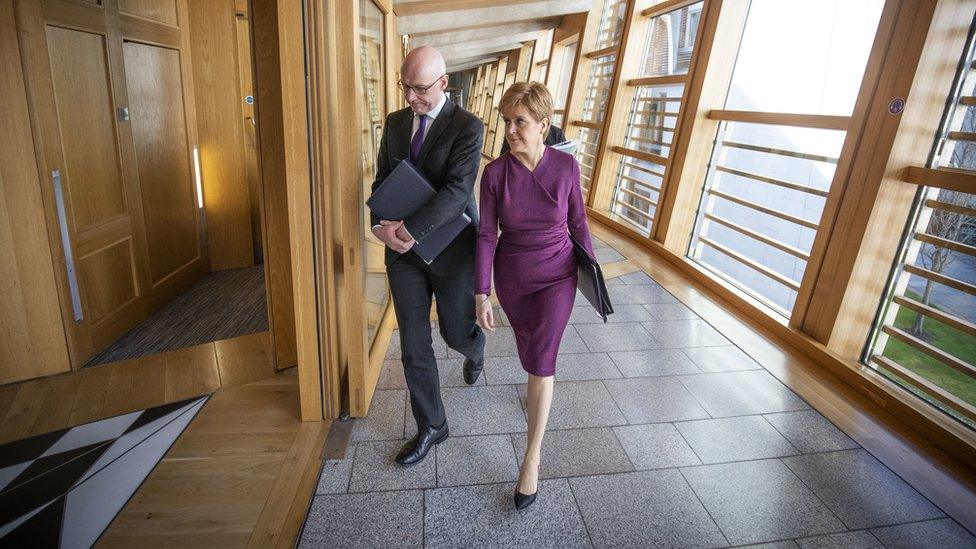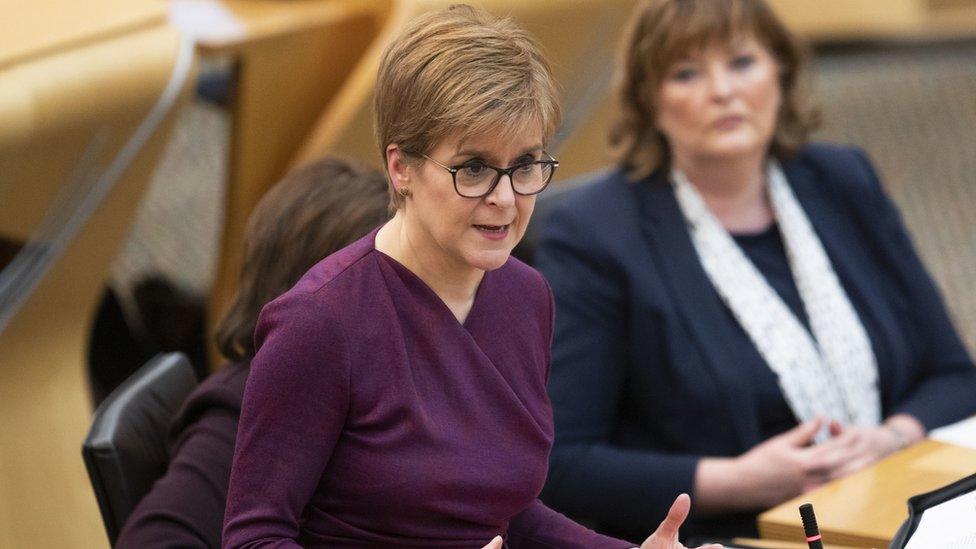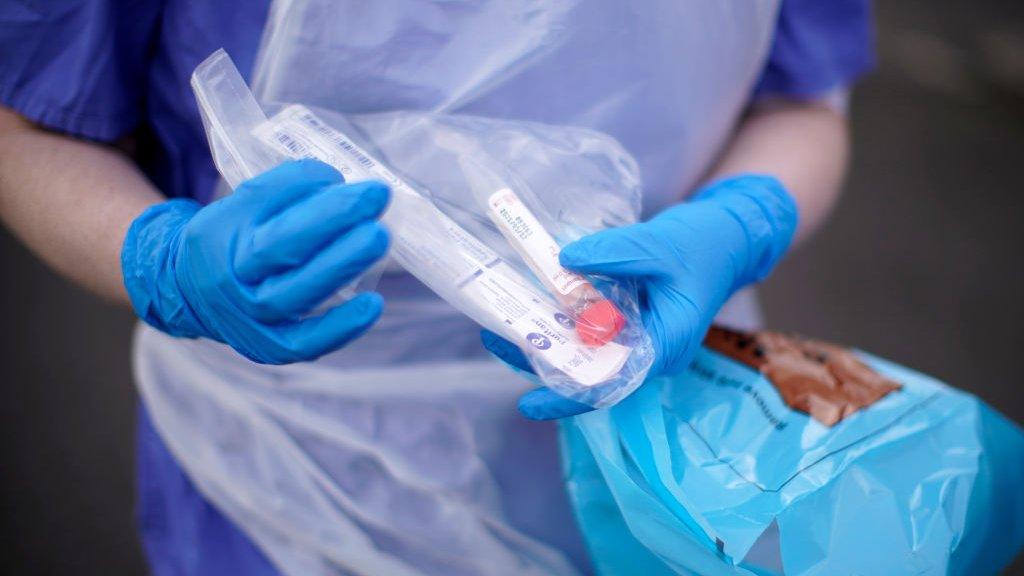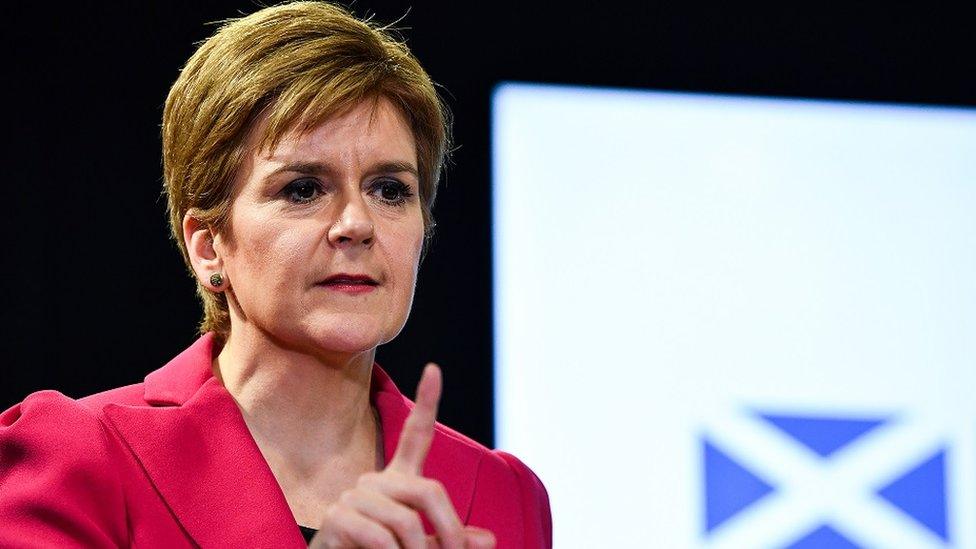Coronavirus: This is not a drill
- Published

Nicola Sturgeon and John Swinney ahead of First Minister's Questions
This, as Nicola Sturgeon pointedly reminded us, is not a drill. This is for real. As the first minister knows and appreciates full well, that lesson has already been thoroughly absorbed by those who have fallen ill, by those who have tragically lost loved ones and by those whose livelihoods are in jeopardy.
To that extensive list, we must now add school pupils and their parents. With solemn demeanour, the Education Secretary John Swinney announced that he was cancelling Scotland's certificate exams for this year.
Instead, pupils will be awarded qualifications based on other material - such as prelim exam results, course work and teacher assessment.
More gravely still, Mr Swinney confirmed that this was the first time Scotland's formal exam diet had been cancelled. Ever. Since 1888, pupils in Scotland have sat exams every year, with trepidation or determination or both.
But not this year. The monumental crisis that is coronavirus has generated another problem, another challenge. And it is truly gigantic.

EASY STEPS: How to keep safe
A SIMPLE GUIDE: What are the symptoms?
CONTAINMENT: What it means to self-isolate
HEALTH MYTHS: The fake advice you should ignore
MORE OF YOUR QUESTIONS: Answers on breastfeeding, pets and church

Ms Sturgeon confessed that closing schools from this week was the toughest decision she had taken in her lengthy ministerial career. It was plain from Mr Swinney's tone that he feels the same.
Consider, firstly, the practical impact. The school curriculum for those in S4 to S6 has been deliberately leading up to those exams, starting with Higher German on the 27 April.
One may consider whether exams should be so central. One may, philosophically, question the nature of contemporary pedagogy.
Or, rather, you can if you want. I reckon there's no time for such indulgence. That's how it is. That's what parents expect. That's what employers, universities and colleges expect. That's what pupils deal with.
But not this year. Not for the current cohort of pupils. So schools will have to assemble other evidence of pupil attainment and submit that to the SQA, who will award certificates on the basis of that evidence.
Mr Swinney indicated that the SQA verdict would be available by the scheduled date of 4 August, if not earlier. Perhaps an earlier ruling might facilitate the flood of appeals one can reasonably expect from anxious pupils and parents. I suspect the SQA may have to be flexible on such matters.
Is this fair to every pupil? Friends, it is not. Perhaps one might consider here the Ballantyne question. Michelle B, that is, the Tory MSP.
What, she inquired, about those children who "don't pull their socks up until the last moment?". Perhaps, one might presume, by making a hash of their prelims. Some kids need the shock of poor prelims to motivate them for those final exams.
When they took those prelims, they didn't know that the "real" exams would be cancelled? They didn't know the relative significance that would be attached to their efforts at that time.
Is that fair? Again, no.
But consider. What was Mr Swinney expected to do? What was Fiona Robertson, the chief examining officer at the SQA, expected to do?
Run the exams as usual? Unthinkable. Schools are to close and there is a presumption against large gatherings, whether social in pubs and restaurants or anti-social in exam halls.
Well, why not postpone the exams? Defer them until later? Snag is when. Perhaps it might be possible to hold the exams after the crisis is over.
Great idea. If you are able to say, right now, with a degree of certainty, when the crisis will be over, or even when it will have eased sufficiently.
June? July? The autumn? Pupils cannot wait for ever. Universities and colleges might hold off a bit - but they need to fill their places, they need to begin their new terms, with a new host of eager students.
Plus would it be fair to ask pupils to sit exams in three, four or five months' time - when they may have been denied their customary formal schooling in the interim period? Again, no.
'The fragility of life'
John Swinney smiled darkly when he was asked to contemplate events three months hence or so. He informed his fellow MSPs that he was currently focused on getting through the day.
And so, he argued, the idea of assessment is the only one that works. He did not even attempt to pretend that it was ideal, that it would be universally popular. But then such luxuries are not available to us in this hideous crisis.
In his statement, Mr Swinney set out a legion of responses to other crucial issues. The provision of free school meals, protection for vulnerable children, childcare cover for key workers such as doctors and nurses.
All difficult, verging on impossible. But all requiring to be addressed, by individual and collective endeavour. Mr Swinney said he had been "humbled" by the initiatives already generated by local councils and others.

Nicola Sturgeon said the coronavirus crisis drew for us "a really hard lesson about the fragility of life"
Answering questions earlier, Nicola Sturgeon ventured, briefly, from the pragmatic into more fundamental considerations.
She said this crisis drew for us "a really hard lesson about the fragility of life". How easily, she said, our routines of duty, work and pleasure were disrupted.
At the same time, she said, we were perhaps also beginning to learn what really matters. Friendship. Community.
Perhaps we may contrive to appreciate such factors more permanently, in due course. Once we have discerned when - or, for some, whether - we are able to resume our lives.
- Published12 March 2020

- Published9 March 2020

